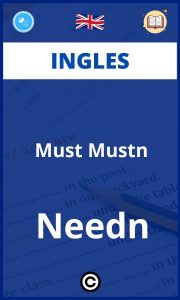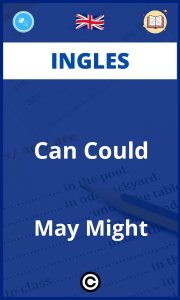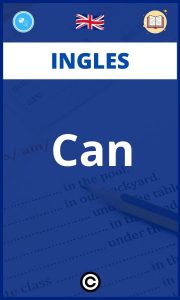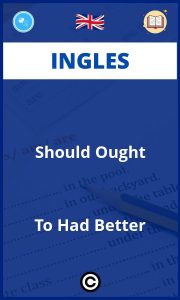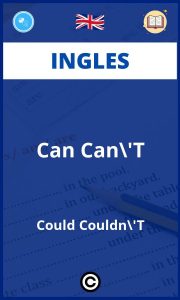
Abrir Ejercicios Ingles Can Could Be Able To – PDF
Teoria : Explicacion y Ejemplos Ingles Can Could Be Able To
In English, the modal verbs are can, could, may, might, must, shall, should, will, and would. These special verbs give additional information about the function of the main verb that follows it. For example,
I can swim.
You could speak French, but you don’t.
They may visit tomorrow.
We might go to the movies tonight.
You must turn in your paper by Friday.
Children shall be seen and not heard.
You should call your parents.
I will be there in a minute.
You would like some pie.
The modal verb is always the second verb in a double verb construction. For example,
I can swim. NOT I swim can.
You could speak French, but you don’t. NOT French speak could you?
The modal verb can also be used with the main verb to be. For example,
I can be there in a minute.
You could be right.
The negative form of a modal verb is made by adding not after the modal. For example,
I cannot swim.
You could not speak French.
The question form of a modal verb is made by inverting the modal verb and the subject pronoun. For example,
Can I swim?
Could you speak French?
The modal verb can has two main uses. First, it is used to express ability or opportunity. For example,
I can swim. (ability)
The store can deliver the furniture tomorrow. (opportunity)
Second, can is used to express possibility. For example,
It can rain tomorrow. (= Maybe it will rain tomorrow.)
That can’t be true. (= I don’t believe that is true.)
The modal verb could has two main uses. First, it is used to express past ability. For example,
I could swim when I was a child. (= But now I can’t swim.)
The store could deliver the furniture yesterday, but we didn’t call them in time. (= But they didn’t deliver it.)
Second, could is used to express present or future possibility. For example,
It could rain tomorrow.
I could be late for work. (= Maybe I will be late.)
The modal verb may has two main uses. First, it is used to express present or future possibility. For example,
It may rain tomorrow.
I may be late for work. (= Maybe I will be late.)
Second, may is used to give or ask permission. For example,
You may go now. (= I am giving you permission to go.)
May I sit down? (= I am asking for permission to sit down.)
The modal verb might is used to express present or future possibility. For example,
It might rain tomorrow.
I might be late for work. (= Maybe I will be late.)
The modal verb must is used to express obligation or necessity. For example,
I must go now. (= I have to go now.)
You mustn’t smoke in this building. (= You are not allowed to smoke here.)
We mustn’t make too much noise. (= We shouldn’t make too much noise.)
The modal verb shall is used to express future tense. For example,
I shall go to the store tomorrow.
You shall not pass! (= This is a famous line from the movie «The Lord of the Rings».)
The modal verb should has two main uses. First, it is used to express obligation or necessity. For example,
You should go now. (= You have to go now.)
We shouldn’t make too much noise. (= We shouldn’t make too much noise.)
Second, should is used to give advice. For example,
You should call your parents.
You should see a doctor if you are sick.
The modal verb will is used to express future tense. For example,
I will go to the store tomorrow.
You will not pass! (= This is a famous line from the movie «The Lord of the Rings».)
The modal verb would has two main uses. First, it is used to express past tense. For example,
I would go to the store every day.
You would not pass! (= This is a famous line from the movie «The Lord of the Rings».)
Second, would is used to express polite requests. For example,
Would you please open the door?
Would you like some pie?
Ejercicios con soluciones de Ingles Can Could Be Able To
A continuación te ofrecemos un listado de ejercicios de inglés con sus respectivas soluciones. Se trata de ejercicios variados para que practiques diferentes aspectos gramaticales y mejores tu fluidez y pronunciación. 1) Completa las frases con la forma correcta del verbo TO BE en inglés. I __________ a teacher. You _________ a student. She _________ a doctor. We _________ friends. They _________ from Spain. 2) Completa las frases con la forma correcta del verbo TO HAVE en inglés. I __________ a car. You _________ a computer. She _________ a pet. We _________ a party. They _________ a problem. 3) Completa las frases con la forma correcta del verbo TO DO en inglés. I __________ the laundry. You _________ your homework. She _________ the dishes. We _________ the shopping. They _________ a lot of exercise. 4) Escribe la forma correcta del verbo TO GO en inglés. I __________ to school. You _________ to the store. She _________ to the park. We _________ to the movies. They _________ to the beach. 5) Completa las frases con la forma correcta del verbo TO SEE en inglés. I __________ a movie. You _________ a play. She _________ a concert. We _________ a museum. They _________ a soccer game. 6) Completa las frases con la forma correcta del verbo TO EAT en inglés. I __________ breakfast. You _________ lunch. She _________ dinner. We _________ a snack. They _________ dessert. 7) Completa las frases con la forma correcta del verbo TO READ en inglés. I __________ a book. You _________ a magazine. She _________ the newspaper. We _________ a story. They _________ a poem. 8) Completa las frases con la forma correcta del verbo TO TAKE en inglés. I __________ a picture. You _________ a trip. She _________ a bath. We _________ a walk. They _________ a break. 9) Completa las frases con la forma correcta del verbo TO COME en inglés. I __________ home. You _________ to my house. She _________ from work. We _________ to the party. They _________ from vacation. 10) Completa las frases con la forma correcta del verbo TO LOOK FOR en inglés. I __________ my keys. You _________ a new job. She _________ her cat. We _________ a place to eat. They _________ their tickets. Soluciones 1) Completa las frases con la forma correcta del verbo TO BE en inglés. I am a teacher. You are a student. She is a doctor. We are friends. They are from Spain. 2) Completa las frases con la forma correcta del verbo TO HAVE en inglés. I have a car. You have a computer. She has a pet. We have a party. They have a problem. 3) Completa las frases con la forma correcta del verbo TO DO en inglés. I do the laundry. You do your homework. She does the dishes. We do the shopping. They do a lot of exercise. 4) Escribe la forma correcta del verbo TO GO en inglés. I go to school. You go to the store. She goes to the park. We go to the movies. They go to the beach. 5) Completa las frases con la forma correcta del verbo TO SEE en inglés. I see a movie. You see a play. She sees a concert. We see a museum. They see a soccer game. 6) Completa las frases con la forma correcta del verbo TO EAT en inglés. I eat breakfast. You eat lunch. She eats dinner. We eat a snack. They eat dessert. 7) Completa las frases con la forma correcta del verbo TO READ en inglés. I read a book. You read a magazine. She reads the newspaper. We read a story. They read a poem. 8) Completa las frases con la forma correcta del verbo TO TAKE en inglés. I take a picture. You take a trip. She takes a bath. We take a walk. They take a break. 9) Completa las frases con la forma correcta del verbo TO COME en inglés. I come home. You come to my house. She comes from work. We come to the party. They come from vacation. 10) Completa las frases con la forma correcta del verbo TO LOOK FOR en inglés. I look for my keys. You look for a new job. She looks for her cat. We look for a place to eat. They look for their tickets.
Abrir Ejercicios Can Could Be Able To Ingles – PDF

